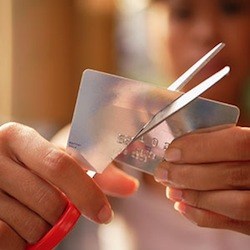We are a society that runs largely on plastic. It’s easy. It’s convenient. And we don’t really have to watch the money leave our hands. And, if we are using credit cards, the money being used may not even be ours. Credit cards, when used irresponsibly, can have devastating effects on your finances:
Out of Sight, Out of Mind
One of the biggest issues is a mental issue. When using credit cards, it is easy to rack up the balances because you don’t actually see the money going anywhere. It’s really easy to spend a great deal in a short amount of time because you’re not pulling a dwindling pile of cash out of your pocket. Without really paying attention to what you are doing, you might find yourself spending more than you thought you would. (Indeed, studies show that those who use credit cards spend more on an average shopping trip than those who use cash.)
The fix: Pay attention to your spending. Just as your track money coming out of your checking account, you should track your credit card spending. Personal finance software can help you keep track, and financial applications on your smart phone can keep you up-to-the-minute. Consider what you spend on your credit cards as coming out of your checking account, and prepare to pay the balance of each month.
Carrying a Balance = High Interest Charges
 Credit cards are so devastating because of their interest rates. When you pay interest, you are paying money directly into someone else’s pocket — all for the privilege of borrowing money. While credit card interest rates aren’t the highest out there (they are lower than pay day loan rates), they are still quite high. And, when interest is compounded daily, it means that every day that you have a balance means that you are charged a little more interest. That interest is added to your overall balance, and then interest is charged on your accrued interest as well as the principal. Soon, things get out of hand, and you find you have paid more in interest than you even borrowed in the first place.
Credit cards are so devastating because of their interest rates. When you pay interest, you are paying money directly into someone else’s pocket — all for the privilege of borrowing money. While credit card interest rates aren’t the highest out there (they are lower than pay day loan rates), they are still quite high. And, when interest is compounded daily, it means that every day that you have a balance means that you are charged a little more interest. That interest is added to your overall balance, and then interest is charged on your accrued interest as well as the principal. Soon, things get out of hand, and you find you have paid more in interest than you even borrowed in the first place.
The fix: Pay down your debt as soon as possible. Start with the highest interest credit card first, and put what you can toward paying that card down. If you use your credit card in the future (for rewards programs), make sure that you only spend what is in your budget. Pay off your card balance each month so that you aren’t charged interest.
Small Minimum Payments
It may seem like a great deal. You charge a large purchase on your credit card, and then you only have to pay around $25 a month for it. Score! Unfortunately, if you only pay the minimum payment, you could be paying that purchase off for the next 10 years; chances are that item will be long gone by the time you pay it off. On top of that, when you pay only the minimum payment, most of your payment actually goes toward your monthly interest charges. So the balance is reduced at a snail’s pace. By the time you pay off the card, making only minimum payments, you will have repaid three or four times the amount you originally borrowed.
The fix: Always pay more than the minimum payment. Pay off the entire balance each month if you can. It’s best if you just save up to buy large items, making sure that you can pay off the purchase right after you make it. If you decide you have to have it now, reconsider. If you can’t pay off an item in two months, you really probably can’t afford it.
The Debt Cycle
The combination of easy spending, high interest rates and low minimum payments makes credit cards so devastating to finances. It promotes a cycle of debt in which you spend years buying a few things on credit, carrying balances and paying them down slowly. Indeed, this combination is exactly what credit card issuers want: An army of consumers that are able to continue to make payments (comprised mostly of interest charges) without actually completely succumbing. It’s about encouraging consumers to live on the edge.
If you want to break the debt cycle, you have to get back to financial basics:
- Spend less than you earn.
- Create a spending plan or budget and stick to it.
- Say “no” to consumer items you can’t actually afford.
- Pay down debt.
- Save for the future.
Work toward moving beyond the debt cycle, and you will find that credit cards lose their power to devastate you financially.
Miranda is freelance journalist. She specializes in topics related to money, especially personal finance, small business, and investing. You can read more of my writing at Planting Money Seeds.
